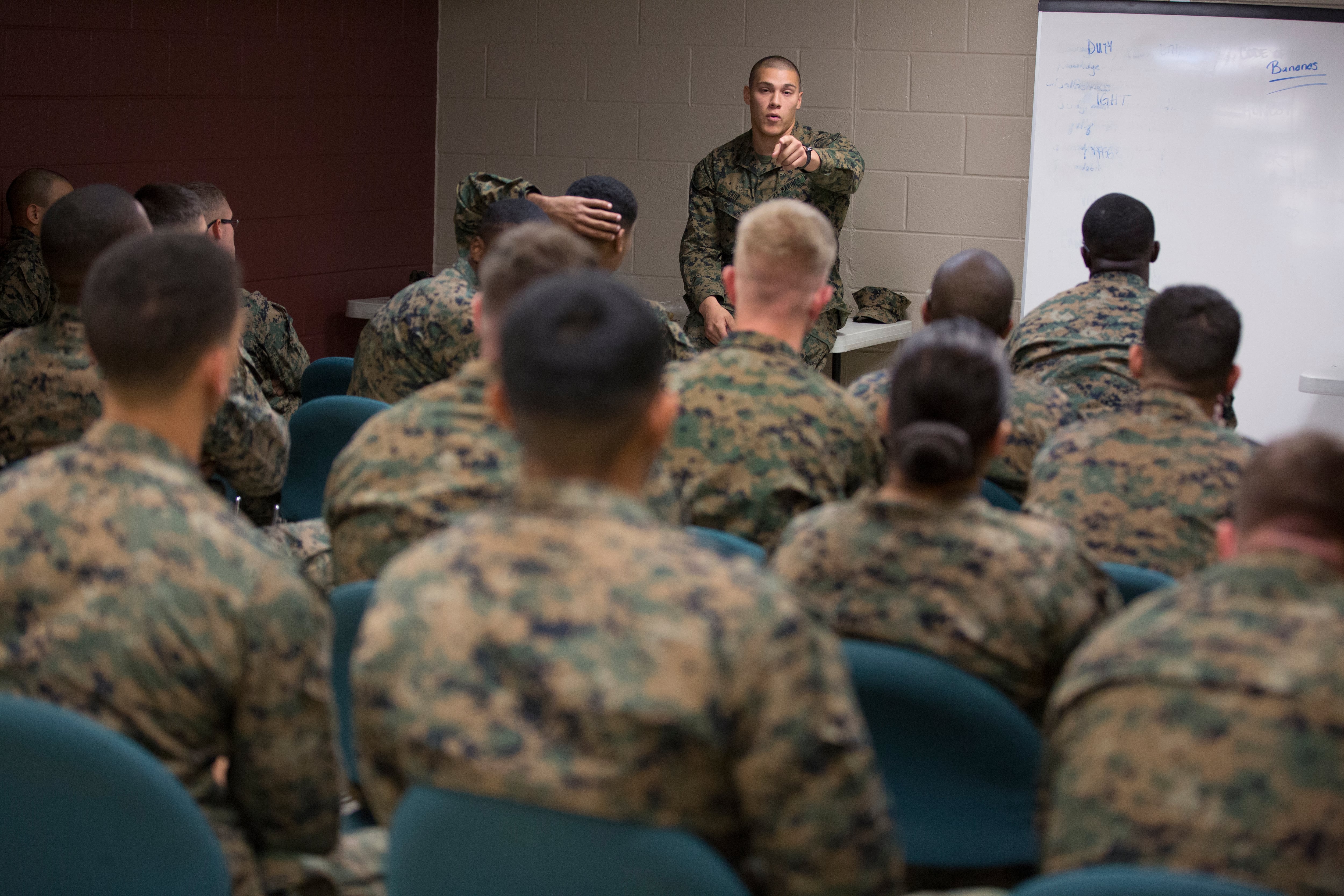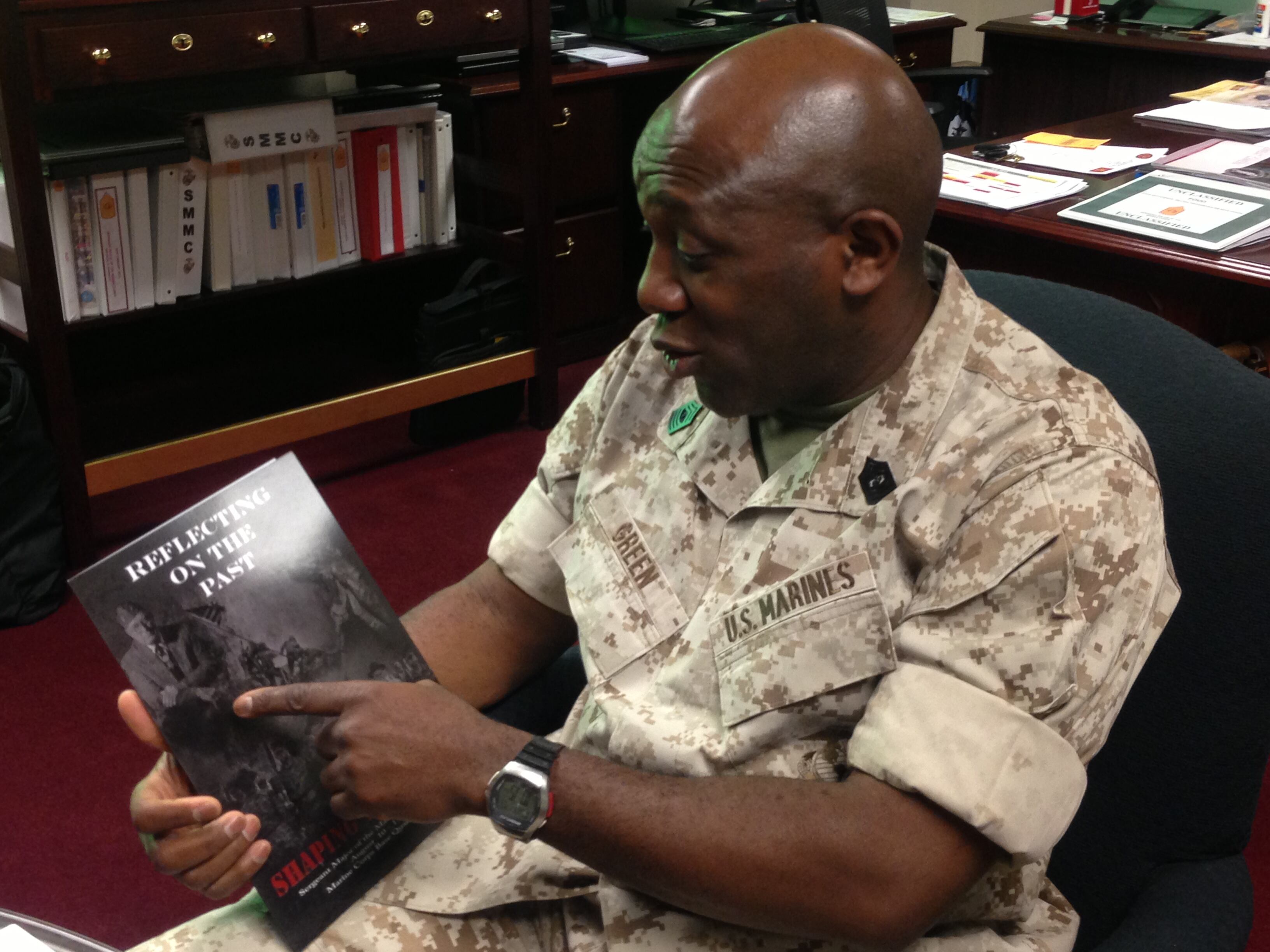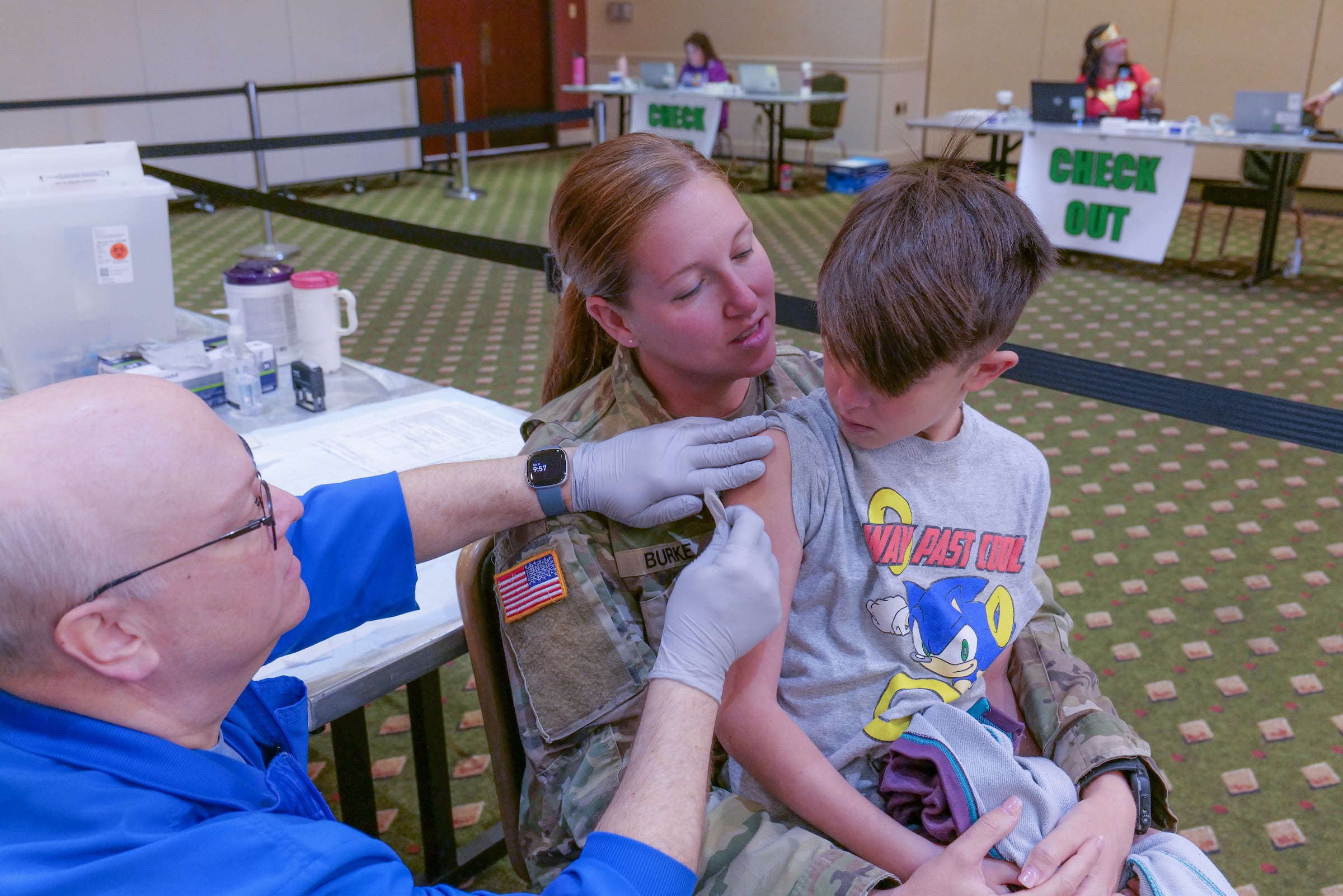As Sgt. Maj. Ronald Green settles into his new role as the top enlisted Marine, he's planning to fine-tune professional military education and advise leaders about new ways to retain and recruit talent, he said in his first interview with Marine Corps Times since moving to the Pentagon. When the Corps' top enlisted leaders gathered at Quantico last week for the Sergeant Major of the Marine Corps Symposium, fine-tuning professional military education was among the top items on their agenda.
Green The symposium was the first hosted by Sgt. Maj. Ronald Green, who became the Corps' top senior enlisted adviser leader in February, just wrapped up his first Sergeant Major of the Marine Corps Symposium last week. The five-day event brought the top enlisted leaders in the Marine Corps to Quantico, Virginia, through Aug. 14, and and it included a number of features and events personally added by him.
After months of touring the Marine Corps with Commandant Gen. Joseph Dunford and listening to what is on the minds of Marines, Green said he wanted to create a forum for top leaders to address the challenges and opportunities the service faces. He designated one full day of the symposium for working groups, for example, allowing enlisted leaders attendees to workshop and discuss a handful of concepts and initiatives that would shapeing the future of the Marine Corps.
"It's not designed to develop policy," Green said of the event. "It's more about providing advice to our commanders or to convey our recommendations for certain topics we were asked to address and to ensure they are aware of what's important to Marines and their families throughout the Corps."
During the course of the event, Green's interests and priorities became clear. He is committed to building on enlisted PME requirements endorsed by his predecessor and is looking for new ways to develop young Marine leaders.
Now the recommendations from Green and other sergeants major and master gunnery sergeants developed during the event will be sent to the desk of the commandant as they look to help the service prepare for missions and challenges to come. And certain working group topics, like enlisted PME and the books on the Commandant's reading list, dovetail with Green's interests and his experiences from prior commands. The week concluded with recommendations to the commandant on all the topics covered that may be used to hone Marine Corps programs and policies in the future.
Here's a look at what's being considered.
'Squad leaders' for every career field
Enlisted leaders were The symposium received a briefed about new developments to the Squad Leader Development Program for infantrymen. In order to make the program, which offers promotions, bonuses and its own military occupational specialty, even more attractive to grunts, Marines who developed the program are looking to make the program more flexible and offer even more re-up cash to those accepted into the program next year.
The sergeants major and master guns also and spent a day discussing how similar exploring ways to adapt similar "talent management programs could be designed for non-infantry fields.
The idea is to help retain experienced noncommissioned officers after Marine leaders found that there was a shortfall of young leaders. was launched earlier this year for infantrymen in an effort by the commandant to fill shortfalls of mature, trained noncommissioned officers in key leadership roles. It The program remains in the "beta testing" phase on the infantry side, Green said, but officials are already moving forward with ways to apply use the concept to benefit the entire Marine Corps.
The senior enlisted leaders for each element of the Marine air-ground task force discussed the MOSs that are which military occupational specialties from their fields would be best suited for leadership development programs the career development that the program offers, Green said. Certain high-demand, low-density MOSs, like such jobs within cyber operations, he said, seemed an especially good fit, he said for the program.
Meanwhile, he said, the leaders discussed how to improve the original program for infantrymen as it enters its second year. In addition to cash bonuses, Green said, officials may offer program participants a choice of duty stations. In addition, leaders are considering the possibility of building special duty assignments around a two-year tour commitment instead of the current three years to allow troops to spend more time developing within their own MOS.
"We want to make sure that we're not slowing Marines down on either side," Green said. "That's what this is all about: Marines progressing no matter what track they take, and progressing evenly."
PME and promotions
Promotion requirements are about to get tougher for lance corporals and corporals. As of Oct. 1, lance corporals will be required to attend a resident Leadership and Ethics Seminar to be eligible for promotion to corporal. Corporals will need to complete a command-sponsored corporals course in addition to a distance education program to make sergeant.
Ahead of those changes, the sergeants major worked to trouble-shoot any issues that may prevent eligible Marines from completing the required fulfilling the coursework requirement ahead of promotion. Green, who spoke with Marine Corps Times at his office in the Pentagon following the symposium, said he will ould recommend a coding system that would function as a waiver for any Marines unable to who could not complete their resident PME course requirements because of where they were stationed or other factors beyond their control.
Green said they leaders also discussed arranging or facilitating transportation for Marines troops who had to travel to attend their nearest required course. Ultimately, he said, the consensus from the sergeants major was that the Corps is ready to implement the new PME requirements by the October deadline.
"Every Marine will be in a position to be promoted, and that was our goal," he said.

Sgt. Alexis Cruz talks with Marines from the 8th Engineer Support Battalion during the Lance Corporals Leadership and Professional Ethics Seminar at Camp Lejeune, N.C. The course will be required for lance corporals to be eligible for promotion to corporal.
Photo Credit: Mike Morones/Staff
While some lance corporals have asked for a longer resident seminar, Green said the course will likely remain in its one-week format for now. Since they're the largest community with new resident PME requirements, Green said it would be difficult to make their course longer.
"There are about 42,000 lance corporals, and they need to get some work done," he said. "Since they’re in that pyramid, the base of that pyramid, we don’t see a need to make it any longer."
Commandant's Reading List
Top enlisted leaders want to add new books to the Corps' professional reading list and see Marines reading more in general.
Titles that came up during the symposium as possible candidates for the list included "The Five Levels of Leadership" by John C. Maxwell; "The Power of Habit" by Charles Duhigg; and "The Rise of ISIS Isis: A Threat We Can't Ignore" by attorney Jay Sekulow.
To get more books on the list, particularly those dealing with broader topics on such as leadership and human nature, Green suggested that a future rearrangement of the list may be in order, with books sorted by leadership "pillars" instead of rank.
"When I was at [I Marine Expeditionary Force] MEF, I took a look at the reading list and I absolutely enjoyed reading warfighting and history," Green said. "My thought was to take a look at the reading list ... [and] was still effective, and it is, to make sure that senior enlisted leaders out there knew that we need to manage this correctly, manage it and make sure everyone’s doing the right thing."
Green practices what he preaches: hHe has instituted an informal book club in his office in which staff members select books to read and discuss at regular intervals. He also regularly exchanges books with Commandant Gen. Joseph Dunford on a variety of topics.

Sgt. Maj. of the Marine Corps Ronald Green discusses the art concept for this year's Sergeant Major of the Marine Corps Symposium. Green said he wants to make it easier for enlisted Marines to get access to electronic books.
Photo Credit: Hope Hodge Seck/Staff
Green said the sergeants major also examined how troops read and discussed ways to better take advantage of e-reader technology and online formats. The Marine Corps Association now provides unit libraries with 10 ten or more Kindles that Marines can borrow for free, he said. They're also looking to make it easier for Marines to borrow electronic books.
"Now we’re looking at what books, with the Association, that we can get electronically," Green said. "We think that will induce more reading, because it’s not always convenient to have a paperback," he said. and you’re carrying everything else in your bag and you want to be able to read while you're riding the Metro home."
The reading list is due for an update later this year or early next, after Gen. (sel.) Robert Neller becomes the next succeeds Dunford as commandant.
Honing the future force
Enlisted leaders Working groups also examined a slate of revolutionary changes proposed by personnel proposals "force of the future" changes promoted by Defense Secretary Ash Carter and his personnel chief to recruit and retain troops. They include shaking up promotion boards and traditional military career paths. and best practices for developing Marine Corps leaders.
The sergeants major received briefs on an operational planning team examining possible psychological tests to help better select Marine recruits -- a concept recommended in Dunford's planning guidance -- and talked about how to implement Carter's initiatives, which include proposed changes to promotion boards and more flexible career paths for troops. Green said he and the senior enlisted leaders from across the services were scheduled of the other armed services were set to meet with Carter in August within the week to discuss the recommendations and examine ways how to apply them to the individual forces.
For the Marine Corps, Green said a key concern was finding ways to make changes without jeopardizing what the service already does well.
"We want to make sure they don't break the force," he said. "We'll make sure the initiatives are in line with the way we recruit, the way we retain Marines, and that they're in line with our families. We'll make sure all those things are a positive and won't negatively affect where we are now."
During the symposium, the sergeants major also received briefs on the possibility of having Marine recruits take an operational planning team examining possible psychological tests — to help better select Marine recruits -- a concept recommended in Dunford's planning guidance. -- and The idea is to help recruiters determine whether prospective Marines are likely to be able to successfully complete an enlistment term.
Much remains uncertain ahead of the passage of command to Neller, which is set to take place next month, Green said.
"I can't predict the changes," Green said. "... But we'll make sure we'll do no harm. If what we're [changing] is not going to make it better, then we're going to keep doing what we're doing."





